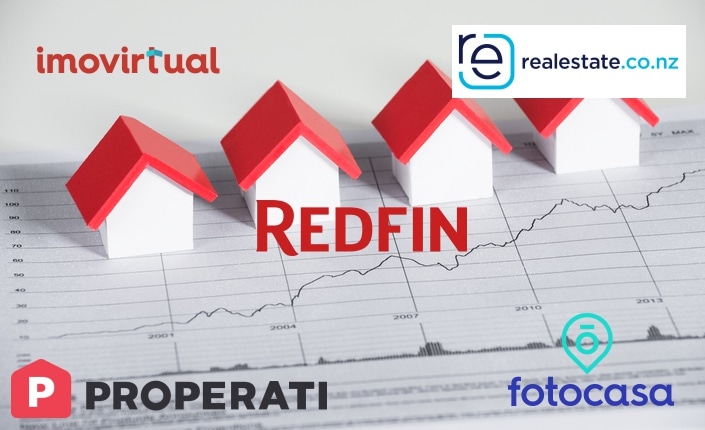
Whether its to inform buyers, maintain thought-leadership or just to give their data and content teams something to do, more or less every property portal in the world now produces some sort of content based on data they collect. For the past few months we have periodically been reviewing some of this output to see who does what well and who doesn’t.
In December we saw how Funda and PropertyGuru were using data to target agents rather than users and how Twindig used data to get users hooked on a property game. Portal content teams around the world have been hard at work since then and these are the reports that stood out in January...
Real Estate Institute of New Zealand: The agent association which owns the realestate.co.nz portal has a veritable treasure trove of reports thanks to which it gets a lot of coverage in national media.
Takeaways: This month the institute used a blog post to highlight the fact that the number of properties sold for more than $1 million around the country was up by 68% in 2020 with Auckland leading the way.
Notable for: What caught our eye this month was the very media-friendly headline finding of REINZ’s latest report: “Number of million dollar plus properties sold in 2020 reaches new record levels according to new REINZ data”. We’re not sure if the marketing department was leaning over the shoulder of the data department or whether the data department is just media-savvy. Either way the report with the pre-written headline got some great national pickup.
Fotocasa: The Adevinta-owned portal’s data and communications team have been trying to keep pace with idealista’s output for some time and are now producing and sending press releases for at least two reports per week.
Takeaways: The report in question ‘La rentabilidad de la vivienda en España en 2020’ is another in the genre of yearly portal real estate profitability report. Key among the findings is that the profitability of real estate in Spain was up to 6.8% in 2020 from 6.5% the year before.
Notable for: As someone who has spent many hours trying unsuccessfully get a content management system to display complicated images, I have some sympathy with the content department at Fotocasa whose efforts to get the all-important images and graphs to display on the portal’s blog post seem to have failed both on desktop and mobile and on various browsers.
Properati: Being part of a big multinational classifieds operator like OLX Group means that Properati can afford its own subdomain-hosted blog and specialist data section much like most other major portals. However the portal also goes directly through national publications such as Gestion.pe to get its message, data and brand out there and maintain thought leadership when it comes to Peruvian property data.
Takeaways: In this case, Gestión uses Properati data to back up a listicle-style article with a series of fairly unremarkable 2020 real estate trends such as the solidity of prices over the year and the increased appetite for second homes.
Notable for: What is really interesting here is that there is no mention of any specific Properati report and there is no hyperlink to anything on Properati’s domain. Publishers and marketers are starting to understand that Google knows when a link is placed as a favour or for commercial reasons and when it’s actually placed because the publisher genuinely believes in and wants to recommend something.
Some influential SEO experts believe that Google may soon value brand mentions in text as much as hyperlinks.
Redfin: We know Redfin is not strictly a property portal, but it’s as close as an agency brand is ever likely to get to being one and the brand’s website is the first port of call for a lot of house-hunting Americans. The Seattle-based brokerage also has a data game to rival most portals which nurtures a steady stream of pretty interesting and useful content.
Takeaways: Redfin regularly commissions companies to run questionnaires, and these in turn often have some useful conclusions. In this case, the company found that a third of homebuyers would consider relocating if remote work became permanent.
Notable for: While a lot of portals seem to think that the only way to get primary data upon which to build an interesting conclusion and get coverage is to use data they already have in their servers from user interactions and listings, Redfin is not afraid to simply ask their customers straightforward questions. Using questionnaires to get data means not only that you can customise the scope of what you want to find out, but also that your brand looks like it cares what people really think and what drives them.
Imovirtual: Most big European property portals now produce housing reports at least once a year. OLX Group-owned Imovirtual is no exception, but it seems that although the data department and content departments did their job for the 2020 version, the graphics department wasn’t available.
Takeaways: “The average price of properties advertised on Imovirtual for sale in Portugal during this year maintained a variation of 1% during all periods, with the exception of the period of confinement where there is a slight decrease of -0.11%. In January, the average price was € 344,417 and in December € 348,223, an increase of 1.1%.”
Maybe it’s just me as a visual person, but it seems like if a property portal wants anyone to actually read their housing reports stacked with so many numbers hidden away in prosaic paragraphs they really do need to go the extra mile and get some infographics.
Notable for: For a company that, according to its social media, has put resources into things such as a new digital magazine for real estate consultants, a podcast series and having a university professor on one of their videos, the lack of any kind of graphics or eye-candy on Imovirtual’s annual report was odd.